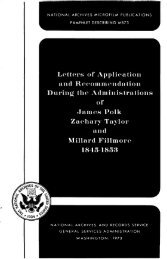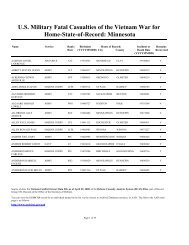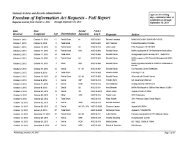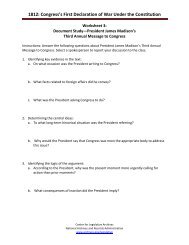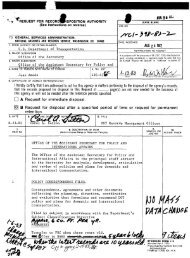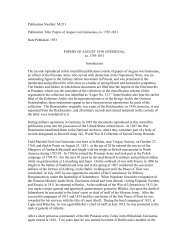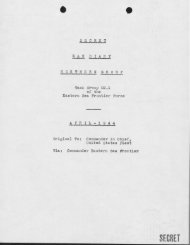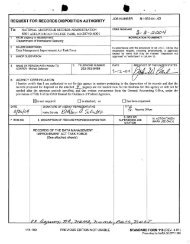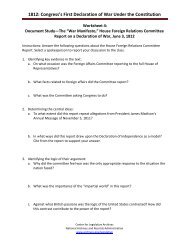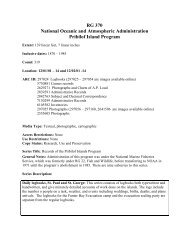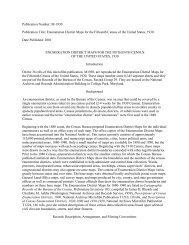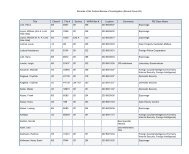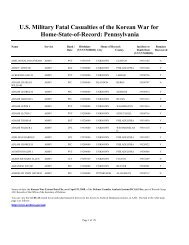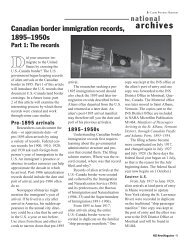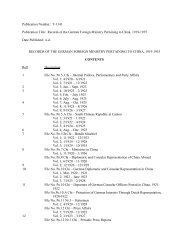HITLER'S SHADOW - National Archives and Records Administration
HITLER'S SHADOW - National Archives and Records Administration
HITLER'S SHADOW - National Archives and Records Administration
Create successful ePaper yourself
Turn your PDF publications into a flip-book with our unique Google optimized e-Paper software.
Mahler’s July 14, 1950, report on “Sedition Activities of the Scholl Twins” is<br />
of interest to scholars of the White Rose insofar as the 17-page report includes<br />
Gestapo efforts to stop the distribution of anti-Hitler leaflets before the arrest of<br />
Hans <strong>and</strong> Sophie Scholl in February 1943. But it also paints Hans Scholl, whom<br />
Mahler interrogated, as a Communist. Scholl came, Mahler said, from a “Marxistic<br />
(sic) oriented family, which nevertheless spread a cloak of religious piety over its<br />
existence.” White Rose leaflets, in Mahler’s retelling, “were atheistic <strong>and</strong> cultural<br />
Bolshevistic propag<strong>and</strong>a….” Under interrogation, Hans Scholl argued “that<br />
communism had been a decided improvement over the Czarist dynasty” <strong>and</strong> that<br />
“an alliance between the Soviet Union <strong>and</strong> Germany could only be advantageous to<br />
both nations.” Mahler further emphasized that White Rose member Falk Harnack<br />
was the brother of Arvid Harnack, a leader in the Soviet spy ring in Germany known<br />
as the Red Orchestra, <strong>and</strong> that the Gestapo had never been able to investigate the<br />
possible connections between the two organizations. In reality, there was nothing<br />
communistic about any of the White Rose leaflets. But the connection impressed<br />
Special Agent Bechtold. He recommended “more active exploitation” of Mahler.<br />
While in hiding, Mahler had his attorney appeal his criminal conviction. The<br />
Superior State Court in Munich rejected Mahler’s appeal on December 21, 1951.<br />
Mahler immediately worried for his safety. He tried to blackmail Max Lappler, a KPD<br />
member, with exposure as a CIC informant if Lappler did not produce the “order”<br />
by the East German Communist Party (SED) that Mahler thought prompted the<br />
West German KPD to use criminal trials to neutralize former Gestapo figures. Such,<br />
Mahler thought, would negate his conviction. 67 He also asked West Germany’s neo-<br />
Nazi party (the Socialist Reich Party) to help him escape Germany for Argentina<br />
<strong>and</strong> to provide him with financial assistance. He cited his loyalty to the Nazi party as<br />
making him worthy of its aid. 68 The Mahler file ends with this request.<br />
ENDNOTES<br />
1 Allan A. Ryan, Jr., Klaus Barbie <strong>and</strong> the United States Government: The Report, with Documentary Appendix.<br />
To the Attorney General of the United States (Frederick, MD: University Publications of America, 1983).<br />
2 Tactical Interrogation of Members of the RSHA, May 21, 1945, NARA RG 226, Entry 119A, box 22, folder<br />
621. W.R.C. Fortnightly Report, June 18, 1945, NARA RG 226, Entry 119A, box 25, folder 639. Saint to<br />
Saint Washington, Info Saint, Austria, War Room Summary ending July 18, NARA RG 226, Entry 88, box<br />
388, folder 645. These documents were declassified in 2000.<br />
New Materials on Former Gestapo Officers | 49



